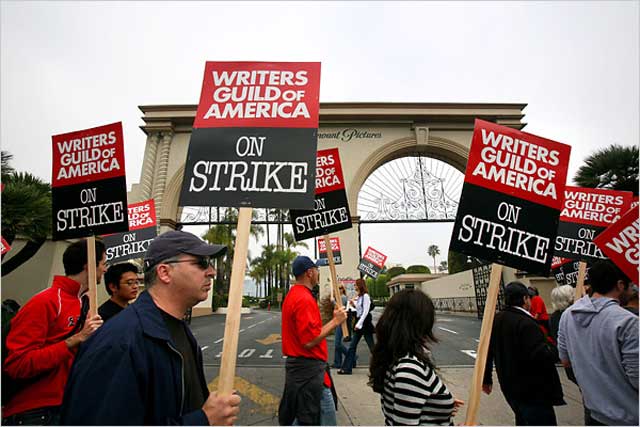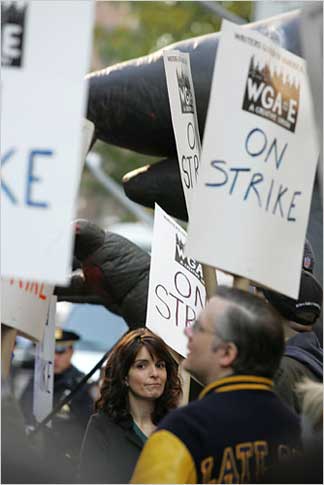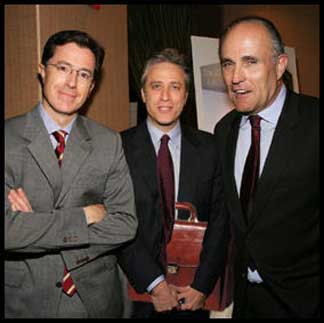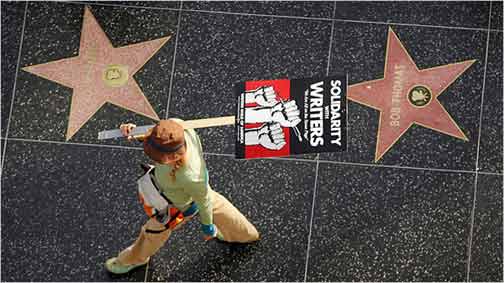As Hollywood writers stand their ground against the ultra-super-greedy corporations who don't want to share a penny from the billions they are sure to make on the Internet, a heated debate is going on in several blogs and websites about a number of comedians who decided to cross the picket lines after the union refused to make a deal with them.
The debate is specially heated regarding Jon Stewart and Stephen Colbert because they are widely considered heroes by many in the left, some of whom see this move as a betrayal (they are members of the union on strike and had to physically cross the picket lines to make new episodes of their shows); while others scramble for ways to justify them (the main argument being that the union made deals with other shows).
Check for example the discussion below this article at campusprogress.org or google it.
For starters, check out this video made early on the strike by the writers of The Daily Show. You will also find below a couple of interesting pieces we found. Feel free to add comments at the end of this posting if you get excited or can't go to sleep (like me).
Also, if you are new to picket lines, I recommend the short entry on the topic at the wikipedia: http://en.wikipedia.org/wiki/Picket_line.
Are Jon Stewart and Stephen Colbert Scabs?
You bet. Think twice before tuning in.By Saxon Baird
January 10, 2008

Courtesy of Comedy Central
Don't fool yourself: Jon Stewart and Stephen Colbert are scabs. As members of the Writers Guild of America, or WGA, both hosts officially crossed the picket lines of striking writers by taping new episodes this week. While fans of "The Daily Show" and "The Colbert Report" may be happy that their favorite faux-news programs are back on the air, progressives should think twice before tuning in: The show clearly has pre-written scripts, and Stewart's and Colbert's decisions to tape new episodes is a slap in the face to the writers who have been on strike since early last November.
No one, not even the reporters over at the New York Times, have been able to figure out why Stewart and Colbert have decided to return to the air. In a joint statement released on Dec. 20, Colbert and Stewart expressed their desire to show their “ambivalence” about the strike, but lamely joked that without their writers they were “unable to express something as nuanced as ambivalence.” This statement epitomized the hosts’ partially apologetic yet derisive attitude toward the whole ordeal.
There's a case to be made that Colbert's and Stewart's decisions aren't completely an affront to the writers’ cause. After all, going back on the air provides a job and much needed paychecks for the cameramen and stagehands that have also been out of work since the strike. And the move is rooted in precedent. During the 1988 Writers Guild strike, Johnny Carson, who was not a member of WGA, continued to air new episodes of his show. It was easy for him to portray himself as a hero because other than a little extra work writing jokes with Ed McMahon, the strike didn’t directly affect Carson. Publicly, he supported the writers and was praised for it. Had Carson decided to not air new episodes of his show, ratings would have dropped and the network would have suffered. Instead, Carson maintained his ratings, kept the network content, supported the writers, and gladly accepted his paycheck at the end of the day. In reality, Carson was a bit more of an opportunist than a voice for the hard-working, underpaid writer. Colbert and Stewart are trying to follow Carson’s lead, but it’s not working.
While this may partially excuse Stewart and Colbert, it does not protect them from all criticism. Over the last few years, their shows have become widely popular and even gained status as credible news sources that maintain a level of satirical edge wholly unique from almost any news show or program in the United States. Stewart and Colbert’s comedy has developed a reputation and following. They are two reliable voices that are willing to expose the falsities, errors, and absurdities of American politicians and pundits. That is why their actions and the slant of their current critiques regarding the labor dispute are so surprising.
In an interesting choice, Stephen Colbert invited Harvard professor and leading labor economist Richard Freeman, the author of America Works, to be a guest on Monday night’s show. After a brief interview in which Colbert called him a “blue-collar brute,” the host asked his guest a poignant question loaded with meaning.
“Are you a part of a union?”
Freeman answered no. Colbert seemed to be suggesting that a non-union member really doesn't have the perspective—or the right—to criticize the players in the union strike.The bottom line, though, is that every joke on the shows this week was made while the writers remained on the picket lines without pay, and as Stewart and Colbert continued to collect paychecks. As viewers, we should expect the hosts to make us laugh while still carrying on their tradition of being socially and politically poignant. As high-profile members of the WGA, they have the potential to be loud and effective figures in the strike. We do not usually know the names, much less the faces, of the writers of our favorite shows. Who better to take up the cause than famous figures like Stewart and Colbert that are also card-carrying members?
It is still to be determined whether or not their defiant actions have actually undermined the efforts of the writers. Until then, the real question lies with the viewers. How much do we care? Because networks depend so much on ratings, our decision to view or not view determines on which side of the picket line we stand.
Saxon Baird is a senior at Portland State University.
December 2007

Members of Writers Guild of America - West picket Paramount film studios on first day of nation-wide
strike by TV screenwriters. Remember what happened to PATCO – all out to defend the WGA strike!
(Photo: Monica Almeida/The New York Times)
As the strike by film and television writers nears its two-month mark, the 12,000 members of the affiliated East and West Coast Writers Guild of America (WGA) have shown determination and kept up morale at picket lines and mass rallies in Los Angeles and New York. Viewer ratings for late-night TV talk shows have plummeted as audiences are subjected to endless reruns. The exodus of younger viewers from traditional TV, troubling to the advertisers who bankroll the media companies, increased as Internet versions of their favorite shows sprouted. For the first time, the writers’ action is having an impact on Hollywood glitz as the WGA announced it will picket the mid-January Golden Globe awards and refused a waiver for the late-February Academy Awards.
Yet even as “The Strike Starts to Bite” (London Independent, 19 December), the Alliance of Motion Picture and Television Producers (AMPTP) is refusing to bargain and marshaling forces in an attempt to break the walkout. Many writers vow they are prepared to stay out for months. Such determination is vital, but it is not enough. The question of what it will take not just to hold on but to win the strike is sharply posed.
 Tina Fey of 30 Rock and formerly Saturday Night Live, on picket line next to labor's inflatable rat outside Time-Warner Center in NYC. (Photo: Librado Romero/New York Times)
Tina Fey of 30 Rock and formerly Saturday Night Live, on picket line next to labor's inflatable rat outside Time-Warner Center in NYC. (Photo: Librado Romero/New York Times)
Early on in the strike, celebrities including Tina Fey, Julianne Moore, Holly Hunter, Roseanne Bar, Robin Williams, Tim Robbins and others came out to walk the line next to labor’s giant inflatable rat outside the Time Warner Center in NYC’s Columbus Circle. That was when the walkout was being dubbed a “glamour strike.” Now the media are playing up the actions of TV personalities who are despicably crossing picket lines, such as hip comedian Ellen DeGeneres (who almost immediately began scabbing on the strike by her own union) and late-late-night talk show host Carson Daly, or the big names of late-night celebrity and comedy shows including Jay Leno, Jimmy Kimmel, Conan O’Brien, Jon Stewart and Stephen Colbert (all of whom are WGA members) who have announced they will become strikebreakers as of the new year. (David Letterman is still up in the air, seeking a separate deal with the Guild.)
The issue here is simple: picket lines mean don’t cross, period. Those who cross are scabs and should be treated as such.
But a dangerous second prong in the union-busting attack is the studio execs’ effort to undercut the writers by exploiting the parochial craft-union divisions that hobble white-collar and manual workers in the industry. The AMPTP, which brings together global media behemoths including Time Warner, General Electric/NBC/Universal, Viacom, Disney/ABC, News Corporation/FOX and CBS, walked out of negotiations on December 7. This was after handing the WGA negotiators an ultimatum (refused by the union) that they drop key demands over compensation in “new media” (mainly the Internet), for a portion of advertising revenue, and to represent non-union animation and “reality” TV writers. The bosses also insisted on a no-strike clause to prevent WGA members from honoring other unions’ picket lines.
As columnist Patrick Goldstein noted (“The Big Picture: The Studios Play to Win,” Los Angeles Times, 11 December), “The studios don’t want to make any concessions to the [WGA] that would set a precedent for SAG [Screen Actors Guild] negotiations.” (The SAG contract expires next June 30.) Corporate Hollywood is willing to forgo billions of dollars because the studio tops are confident that the leadership of the entertainment industry unions will turn on each other and play into the hands of Rupert Murdoch and Sumner Redstone. Instead of frittering away its limited obstruction of the profit streams flowing into the coffers of the multi-media empires by negotiating exceptions and waivers to favored hosts and producers, the WGA should make a concerted effort to broaden the strike to include all industry workers.
 BFF: Comedian scabs-to-be Stephen Colbert and Jon Stewart with labor hater Rudy Giuliani.
BFF: Comedian scabs-to-be Stephen Colbert and Jon Stewart with labor hater Rudy Giuliani.
Meanwhile, the Directors Guild, which had been holding off negotiations while the WGA strike was on, announced that it would begin negotiating its own contract with the studios by New Year’s. The industry press unanimously sees this as a move to undercut the writers. Of course, if the writers, actors and directors guild leaders actually represented the interests of their members, the beginning of directors’ and actors’ negotiations could open up a second front against the producers. But instead, they actually represent the aristocracy of highly paid stars who can be bought off with exclusive deals while many of their working (and unemployed) members struggle to make ends meet as their living standards decline. The necessary united struggle against the studio bosses will not be the result of an insider’s deal or empty gestures of official cross-guild “solidarity.”
The giant media corporations that either directly own or heavily influence the Hollywood studios are counting on riding out the strike on the strength of their global, diversified sources of income. From the printed page to Internet webcasts, from CD’s to Broadway extravaganzas, the media moguls have many reserves to draw on. (Several of these conglomerates are also major military contractors.) To win, the writers must break out of their craft union isolation and mobilize a power that can actually shut down the production process – namely, the working class. To turn the writers’ strike from a precarious middle-class craft dispute into a powerful class struggle requires a leadership with a program to unite workers against the racist, war-mongering media bosses.
Instead, from the leaders of the Writers, Actors and Directors Guilds, to the International Alliance of Theatrical Stage Employees (IATSE) and the Teamsters, a conservative labor bureaucracy stands in the way of writers and other media industry workers. The union tops are obsequiously obliging to the studio capitalists, and abhor labor solidarity to the point, in the case of IATSE president Thomas L. Short, of outright scabbing. (In addition to ridiculing the WGA in the press, Short has instructed his members to cross writers’ picket lines, as well as trying to organize a “back to work” movement.) These labor fakers are also bound to the strike-breaking Democratic Party, even as the studio bosses hired a public relations firm tied to the Democrats to package management’s insulting “final offer” as a “New Economic Partnership.”
 Hall of Shame: Strikebreaker Ellen DeGeneres (a member of WGA) with Jenna Bush, on phone with her father the president, December 2007.
Hall of Shame: Strikebreaker Ellen DeGeneres (a member of WGA) with Jenna Bush, on phone with her father the president, December 2007.
(Photo: Warner Brothers via AP)
A serious fight to win decent commissions for writers on Internet media, which will set the tone for upcoming negotiations with SAG, must mobilize the full workforce of the media industry, from truck drivers and stagehands to actors and writers, to tie down every tentacle of the multi-media monopoly octopus. Scab hosts and “reality” cast wranglers can limp along without union writing talent – but the sets would literally go dark without the thousands of other workers who never get top billing. The WGA should be appealing to manual workers in the media industry over the heads of their sellout union bureaucrats, demanding improved wages, benefits and job safety for blue-collar media workers. Key to winning this strike is to turn what appears as a narrow dispute over DVD residuals into a broad rebellion against the media titans.
Ultimately there should be a single union representing all workers in broadcast (TV and radio), print (newspaper and magazine) and other media, uniting manual and white-collar workers, including theater and film workers. This is far from impossible. In Germany, a media workers union (IG Medien) existed from 1989 until it fused into a broader service industry union (Ver.di) in 2001. The WGA strike could be a kick-off to organizing such a union. But that will require a conscious struggle to overcome the archaic craft-union divisions and the star-system mentality. It can begin by aggressively picketing scab talk show and “reality” TV programs.
The WGA must stand firm and mobilize its members to make an example of the hosts and showrunners who have betrayed the strike: shut them down! The WGA has criticized so-called reality shows as “non-union television,” and is demanding that reality editors and writers – yes, reality writers, who occupy the bottom rung of wages and benefits and never see their names in lights – along with animation scribes, be covered by the new contract terms. But now these low-cost shows are being used as tools for strikebreaking. (This is not new: Fox’s bottom-feeding “COPS,” a pioneer in the reality/humiliation genre, was brought in to undermine the 1988 writers’ strike.) This underscores the need to mobilize all media workers against the studio bosses who exploit them.
And while petty-bourgeois television writers are hardly a key sector of organized labor, the outcome of the WGA strike could have repercussions on the entire workers movement. Remember what happened when the AFL-CIO let PATCO go down to defeat alone in the opening days of the Reagan administration: this was the opening shot of a decade of union-busting. Bringing hundreds and thousands of union members to WGA picket lines on a daily basis in New York and Los Angeles could turn the tide of this important labor battle.

Labor needs to teach the Hollywood bosses a “reality” lesson: in the real world, nothing happens without the workers! A class-struggle leadership of the WGA would appeal to all studio workers, including the essential blue-collar workers from stagehands to truck drivers to janitorial staff, to join their struggle against the exploiting studio bosses, and would champion their demands in the process. The possibility for broader solidarity in action was hinted at when “freelance” office workers for Viacom’s MTV Networks, amounting to more than three-quarters of the staff in some departments, staged an unexpected, and successful, wildcat strike at the company’s Manhattan headquarters on December 10. But instead of the WGA mobilizing fellow workers, the AMPTP has been able to turn the grievances of some “below the line” studio employees against the writers. On December 9, hiding behind a phony “spontaneous grassroots movement” the moguls lured hundreds of out-of-work studio employees, from hairdressers to laundry workers, into joining an anti-union “strike a deal” rally in Hollywood.






0 comments:
Publicar un comentario